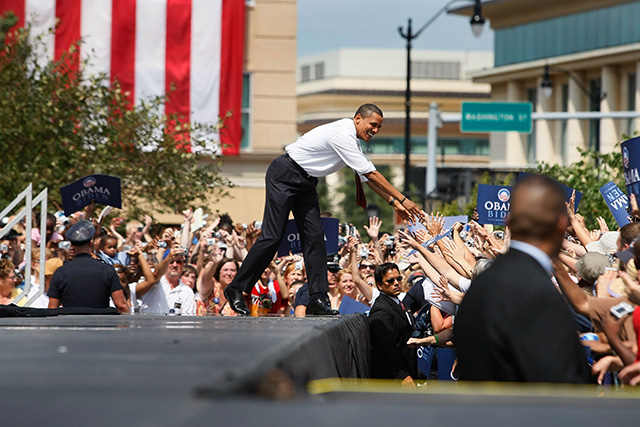At UChicago, Obama Says His Supreme Court Nominee Is In A Catch-22
By Mae Rice in News on Apr 7, 2016 10:31PM

Obama shakes hands with supporters at a campaign rally at the Old State Capitol in August 2008. Photo by Joe Raedle/Getty Images.
President Barack Obama’s nominee for the Supreme Court—Skokie native Merrick Garland, who Obama nominated in mid-March after the death of Justice Antonin Scalia—hasn’t received a preliminary hearing for the judicial seat. At a "townhall-style meeting" at University of Chicago Thursday, Obama argued that Garland's nomination is caught in a political catch-22.
Obama nominated Garland as an antidote to the polarization of American politics, he said, terming Garland a “consensus-builder” and noting that Garland has support from Democrats and Republicans alike. However, the exact polarization that Obama hopes Garland can curb is stymying Garland's nomination.
The judicial nomination process used to be “fairly routine,” Obama said at the University of Chicago Law School, where he once taught constitutional law, and where he appeared today in conversation with professor David Strauss. The typical time from nomination to confirmation for a Supreme Court Justice, Obama noted, is three months. Lately, though, a combination of factors—including a media world increasingly split along political lines—have created a polarized, partisan American politics, where filibusters are commonplace and compromise is rare. Obama referred to this shift, Harry Potter-esquely, as “The Great Sorting.”
This divided climate has been an obstacle to Garland's nomination, even though Obama framed Garland as an extremely mainstream candidate. “Merrick Garland is an extraordinary jurist who is indisputably qualified to serve on the highest court of the land,” Obama said in answer to Strauss’s first, only faintly Garland-related question. “And nobody really argues otherwise.”
However, Garland’s nomination has not progressed smoothly, and Obama spent a large part of his time with Strauss critiquing the system holding Garland back, calling Republican efforts to “gum up the works” and impede the nomination “a breakdown in process.”
Obama also brushed off some critics on his left, who have expressed disappointment that Obama didn’t nominate a female judge or a judge of color (or both). “Yeah, he’s a white guy, but he’s a really outstanding jurist,” Obama said, somewhat jokingly. “Sorry!”
In a more serious tone, he added that rather than focusing on identity politics, he’s trying to make his nominations based on an unbiased process. “If the process is fair, you’ll end up with a really good cross-section of people,” he said, citing his track record of nominating female and minority judges to federal courts as evidence of his fairness.
Obama explained his rationale for choosing Garland, too, spotlighting Garland’s “intellectual integrity” and bipartisan appeal. Obama said he looks for justices who can “bring a humanity” to their role—”justices who understand how the world works, so that they are not entirely blind to the history of racial discrimination or gender discrimination, or how money operates in our world,” Obama said. Garland, he argued, fits the bill.
The townhall meeting at University of Chicago ended in an open Q&A that touched on issues beyond Garland’s nomination. These included criminal justice reform and, in the tensest exchange of the afternoon, drone strikes. One law student asked Obama how he could justify the civilian death toll—and “opaque process”—that has gone hand-in-hand with US drone strikes overseas.
Obama acknowledged that transparency around drone strikes has been a problem, as has a legal infrastructure governing when they’re appropriate. He attributed this to the newness of drone technology.“I think it’s fair to say that in the first couple years of my presidency, the architecture… around how [drones] were utilized was underdeveloped relative to how fast the technology was moving,” Obama said. However, he argued that drone strikes actually cause fewer civilian deaths than traditional modes of war, and added that he hopes to improve public access to information on drone strikes abroad as he wraps up his last presidential term.